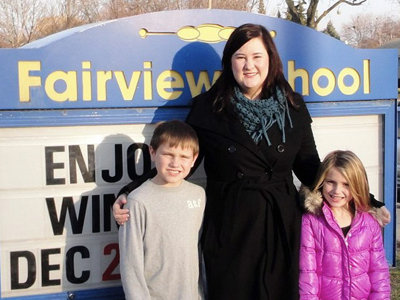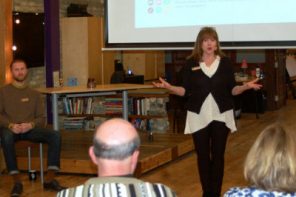School board elections take place on April and in order to help you make a more informed decision at the polls in this race, which often flies under the radar, we’ve asked each of the seven candidates – running for four seats on the 9-member board (there are eight regional districts and one at-large seat) – to respond to a list of questions and we will run them in the weeks leading up to the April 2 election.
Today, we hear from Claire Zautke, who is challenging incumbent David Voeltner in District 7. A map of districts is here.
OnMilwaukee.com: Tell us about your background and how your experience will be an asset to the Milwaukee Public Schools board.
Claire Zautke: I love the city of Milwaukee and believe that Milwaukee cannot survive without a stronger public school system.
I spent some time working at Fairview Elementary School and witnessed the dramatic changes that have affected classrooms across the district – librarians and gym teachers laid off, aides and paraprofessionals shared between classrooms and a large wave of retirements. MPS needs advocates for public education in every seat on the School Board; that’s who I am and who I will be on the Board. Our city cannot afford any complacency.
I have worked as an organizer on Milwaukee’s South Side for years and am passionate about elected officials being engaged and present in the community. I believe that for MPS to thrive, community members needs to be engaged in the school system, whether or not they have children. As a director, I will take a hands on approach to hearing people’s concerns and
suggestions.
OMC: Are you a graduate of MPS or other public schools? Do you or did you have kids in MPS?
CZ: I attended Milwaukee French Immersion School and Samuel Morse School. I firmly believe that MPS, and particularly MFIS, provided me with opportunities that no other school district could have. After college, I worked at a consulate in France. It was an incredible experience that would not have been possible without the education I received in MPS. Largely due to my early life in MPS, one of my goals as a Director is to remind the city of the treasures of MPS.
There are wonderful things in MPS like the language immersion schools, the wonderful music programs at Audubon, or the International Baccalaureate programs which we, as a city and community, should want to protect.
I am running for the Milwaukee Board of School Directors because I want to ensure that MPS
will be strong and the programs that I benefitted from will be available for my future children. I
am not willing to sit idly by as MPS continues to hurt.
OMC: What do you think is the biggest issue facing MPS and what is your plan of for dealing with it?
CZ: Milwaukee Public Schools faces a significant decline in enrollment. Where there used to exceed 100,000 students in the system, enrollment now sits around 80,000. Increasing MPS’ enrollment will necessitate increased funding from the state to the school system. The School Board needs to work with the Administration, students, teachers, staff members and parents to combat the negative image of the district.
We need to market MPS in a way that not only shows students they can be proud of their school, but also informs parents of the resources MPS can offer their children.
OMC: What is your opinion on the expansion of the Milwaukee Parental Choice Program?
CZ: I am fully invested in the success of the public school system. While I will never fault parents for taking advantage of any opportunity to help their children, I believe that the success of the public school system that is vital to the city’s longevity. I oppose the expansion of the MPCP because the millions of dollars spent each year supporting children in non-MPS schools makes it difficult for the school system to work on the problems that drove parents away in the first place.
I want to remind parents of the special programs and resources in MPS that many independent schools cannot offer – like speech therapists, physical and occupational therapists, and special education experts.
I also support increased transparency into the performance and staffing of non-MPS schools that are supported by taxpayers so residents can understand how their money is being used.
OMC: Is there an opportunity for MPS to hold on to students and even draw some back via expansion of specialty schools or other means?
CZ: A major part of my platform is working to increase enrollment in MPS by helping parents make informed decisions on where to send their children. I fully support highlighting the specialty programs and initiatives that make Milwaukee Public Schools unique within the state and which ought to be a draw for parents.
Whether it’s preserving programs like the language immersion schools or expanding programs like the Montessori schools and partnerships between MPS, local businesses and post-secondary schools, Milwaukee is full of opportunities to get creative with our children’s education.
OMC: So you believe that voucher and charter schools should be held to the same standards and accountability as MPS?
CZ: Yes. No one is served by a lack of accountability. Children deserve to be instructed by certified teachers. Parents deserve to be able to track the quality of their children’s schools. Our community deserves to know that the curriculum taught to those who will one day lead our city is preparing them for life.
OMC: How will you work to engage parents and neighborhoods in their schools?
CZ: Parents ought to feel supported by their school system. I look forward to working with MPS’ new parent engagement staff to find creative ways to help parents enjoy being involved in their children’s schooling. I also would like to see parent support networks created within schools to allow parents somewhere to turn for advice if they are not comfortable asking the school.
MPS already has strong connections with local institutions to provide students with interesting
educational opportunities. It would be great to create similar partnerships with institutions that
can help to spread the message about the link between parental involvement and academic
success. Organizations like major employers, community centers and places of worship can
all reach parents and community members in different ways. There needs to be a steady and
consistent message that the parents have to be engaged in the classroom and neighbors have to believe in the schools for students and the district to succeed.
OMC: How do you think MPS can best expand on the successes in the current system?
CZ: The Board and Administration need to work with teachers and school staff to identify what is creating the successes within MPS. Through cooperation we can carry those principles and best practices forward. Teachers need to feel supported within their workplace to do their job and respond to the needs of their children. For MPS to move forward, we have to respect and support our employees.
OMC: How can MPS deal with its massive need for qualified teachers that’s been created in the wake of Act 10?
CZ: Part of what may intimidate new teachers from applying to MPS is the persistent, negative image portrayed about the school system. We need to combat that image with MPS’ success stories to show recruits the difference they can make in children’s lives. Beyond offering a competitive salary to potential hires, MPS needs to show that it will provide a supportive and respectful work environment. Teachers need to feel their principals, Central Office and School Board value their work and will have their backs in times of difficulty.
Moreover, teachers need to be able to respond to their students’ specific needs and learning
styles. Children are motivated to learn in different ways. Some children love the process of
working through a problem. Some children learn through social interaction. Some children are
motivated to do well so they can earn other privileges such as sports, art, music and clubs.
By allowing teachers to tailor their lessons and teaching styles, MPS can help make teaching fun, creative and effective. It is important to not forget that a child’s classroom is also a teacher’s workplace – and a good work environment attracts employees.
OMC: There has been much discussion in recent years of vacant MPS buildings. What is your opinion on the future of these buildings?
CZ: I support looking at all opportunities for the use of MPS property. Vacant, but maintained
schools can be reinvented with innovative new programs. This was the case with the recent
opening of Howard Avenue Montessori School. This is an example of what MPS can achieve
with engaged and creative leadership.
OMC: Finally, do you think spring school board elections are problematic? Do they guarantee low turnout at the polls?
CZ: I intend to speak with as many voters in my district as possible, whether the election is in the spring or fall. Once in office, I will continue to stay involved in the community. My hope is
continued community engagement by elected officials will help to create strong voter turnout.
OMC: Anything you’d like to say, that I haven’t asked about?
CZ: I would be honored to have the support of the voters in District 7.


 i evaluate to yes even if there's no image
i evaluate to yes even if there's no image  i evaluate to yes even if there's no image
i evaluate to yes even if there's no image  i evaluate to yes even if there's no image
i evaluate to yes even if there's no image  i evaluate to yes even if there's no image
i evaluate to yes even if there's no image  i evaluate to yes even if there's no image
i evaluate to yes even if there's no image  i evaluate to yes even if there's no image
i evaluate to yes even if there's no image 